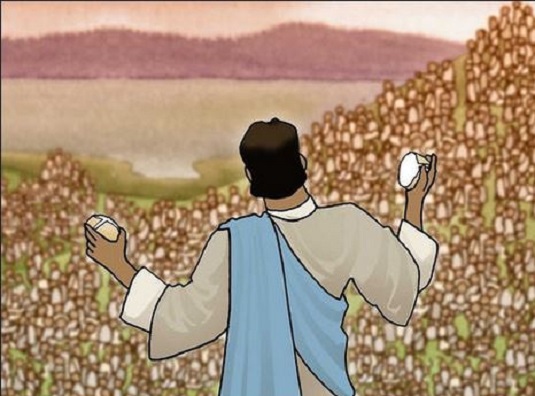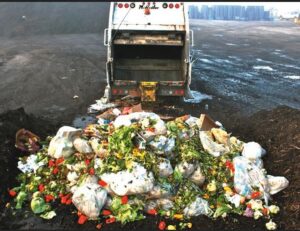John 1:1-15
Jesus went across the Sea of Galilee.
A large crowd followed him,
because they saw the signs he was performing on the sick.
Jesus went up on the mountain,
and there he sat down with his disciples.
The Jewish feast of Passover was near.
When Jesus raised his eyes
and saw that a large crowd was coming to him,
he said to Philip,
“Where can we buy enough food for them to eat?”
He said this to test him,
because he himself knew what he was going to do.
Philip answered him,
“Two hundred days’ wages worth of food would not be enough
for each of them to have a little.”
One of his disciples,
Andrew, the brother of Simon Peter, said to him,
“There is a boy here who has five barley loaves and two fish;
but what good are these for so many?”
Jesus said, “Have the people recline.”
Now there was a great deal of grass in that place.
So the men reclined, about five thousand in number.
Then Jesus took the loaves, gave thanks,
and distributed them to those who were reclining,
and also as much of the fish as they wanted.
When they had had their fill, he said to his disciples,
“Gather the fragments left over,
so that nothing will be wasted.”
So they collected them,
and filled twelve wicker baskets with fragments
from the five barley loaves
that had been more than they could eat.
When the people saw the sign he had done, they said,
“This is truly the Prophet, the one who is to come into the world.”
Since Jesus knew that they were going to come and carry him off
to make him king,
he withdrew again to the mountain alone.

God, being the Creator, has power over His creation, including material objects.
According to the chronicling in the Gospels, Jesus’ first public miracle was the changing of water into wine at a wedding.
The above account in John 1 is another instance of a public miracle by the Second Person of the Triune God — the multiplication of two fish and five loaves of bread into numbers sufficient to feed five thousand people “to the fill,” with leftovers.
We are all familiar with the account of the loaves and fish, but what is often overlooked is Jesus’ frugality:
When they had had their fill, he said to his disciples,
“Gather the fragments left over,
so that nothing will be wasted.”
The dictionary defines “frugality” as “the quality of being frugal, or prudent in saving; the lack of wastefulness”.
Americans, however, are infamous for our wastefulness.
Take food, as an example.

According to the U.S. Food and Drug Administration (FDA), the United States throws away more food than any other country in the world: 133 billion pounds and $161 billion worth of food in 2010, or 30-40% of the entire U.S. food supply.
The U.S. population in 2010 numbered 309,011,469. That means an average of 430 pounds of wasted food per person.
Wasted food is the single largest category of material placed in municipal landfills and represents nourishment that could have helped feed families in need. Additionally, water, energy, and labor used to produce wasted food could have been employed for other purposes.
In fact, according to Recycle Track Systems, Inc. (RTS), a waste and recycling management company, food is the single largest component taking up space inside our landfills, making up 22% of municipal solid waste.
It never ceases to amaze me how much food Americans leave behind on their plates in restaurants — food that can be brought back home in “doggie” bags. I have to suppress my impulse to retrieve the leftover bread on plates, so that I can then break into crumbs for the sparrows and other birds that inhabit our urban landscape.
While I am generally a frugal person, I still manage to waste food because I buy too many veggies that I end up not eating before they rot in the refrigerator. There are at present in my refrigerator a bag of broccoli and a small bag of “baby” carrots that I will need to discard. Aargh!
May the peace of love of Jesus Christ our Lord be with you,
~E
